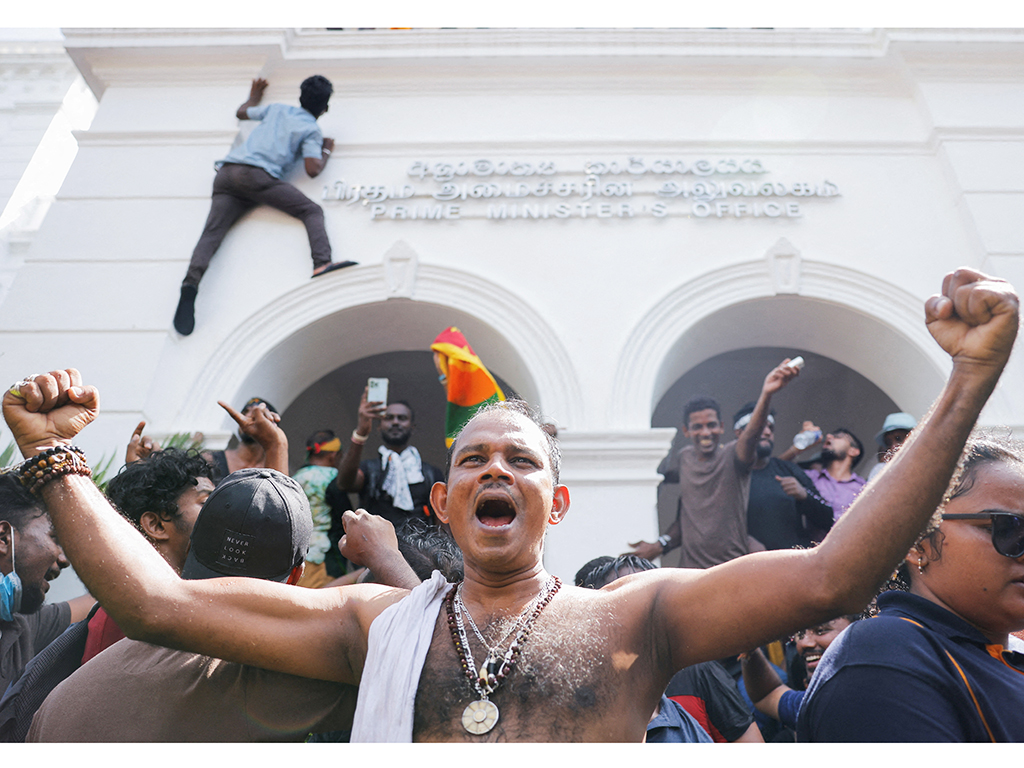
This diary originally appeared on 20 July 2022. On Monday 17 October, Shehan Karunatilaka’s novel won the 2022 Booker Prize.
July was already an important month in the Sri Lankan calendar. In 1983 the anti-Tamil pogrom, known as Black July, launched the Sri Lankan Civil War, which lasted for 26 years. Since the war ended in 2009, no one has been prosecuted for the murder of 3,000 Tamils, the burning of 8,000 homes or the destruction of 5,000 shops.
How will history remember the desperation, unity and victory of July 2022? In my lifetime there has been a series of Sri Lankan tragedies: civil wars, insurrections, state violence, tsunamis and an Easter terrorist attack. Sri Lankans have had two responses. One is a collective shrug and a sigh of resignation. What can we do when our country will never change? The other is the popular phrase “Nava gilunath ban choon”, which means the band will play louder while the ship sinks. First we will laugh at the mess we’re in – then we will weep.
The generation that will save us
In early July the country did change. Millions of Sri Lankans, from all races and classes, united under the movement Aragalaya, which means “struggle”. The group called for Gotabaya Rajapaksa, the president who oversaw Sri Lanka’s economic collapse, to step down. A population with less and less to lose, battered by petrol queues, fuel shortages and power cuts, took over government buildings and sent Rajapaksa running.
Today, we have a generation that will not shrug and accept a situation. The Aragalaya movement is more inclusive and united than any that preceded it. From this ragged bunch will rise heroes who will lead Sri Lanka out of this mess.
[See also: Sri Lanka’s protests boil over]
Rajapaksa’s regrets
I wonder what Rajapaksa is thinking now. Does the man who silenced dissenters and exiled critics feel remorse? Does he regret banning chemical fertiliser, printing money, borrowing trillions, nurturing religious extremism, and employing his family members? Perhaps he is relieved that Sri Lanka is now someone else’s problem.
Watching the soldiers
While the protesters were dancing through the occupied palaces, I was observing the men in uniform. Our greatest fear was that a cornered leader would direct the state’s forces to crush the protests. Should soldiers protect leaders from the public or vice versa? I watched men in uniform giggle at the party in the president’s pool and grin at citizens posing on thrones.
Clashes between protesters and armed forces have been mercifully short-lived, but we have seen the use of tear gas and water cannons, the beating of journalists, and a spray of bullets that claimed lives. Yet, the military stood firm when Mahinda Rajapaksa – Gotabaya’s brother – was ousted by the ballot in 2015. This time, too, the army’s rank and file appears to be standing with the people. We hope this will last, for the alternative would be terrifying.
Writing about ghosts
I wrote a novel about the worst time in Sri Lanka’s history. The Seven Moons of Maali Almeida is set in 1989, during the time of a northern civil war, a southern insurrection, government death squads, and an Indian army with boots in Sri Lanka. The story is about a dead journalist working out which faction had him killed.
I presumed writing about forgotten tragedies would be less problematic, as most of the antagonists of 1989 are dead. Where better to set a ghost story than a period of mass graves and unsolved murders? But I was mistaken. Ranil Wickremesinghe, who until earlier this month was Sri Lanka’s prime minister, has been connected to overseeing the Batalanda torture chambers that existed during the period. Ranasinghe Premadasa, the then president, led a regime of terror; his son is a politician today.
Small hopes
I’ve heard 2022 described as the worst time in Sri Lanka’s history. We have normalised fuel, gas and electricity shortages. However, if the country runs out of food and medicine, law and order will disappear. But this is an economic crisis and there are solutions, such as privatisation, taxation and competition; education, welfare and industry should be prioritised over infrastructure kickbacks and defence.
No, it is not bleaker than 1989, because this time it is the people who are crushing the state. For now, we will wait until the Aragalaya movement can deliver us new political contenders with fresh ideas. Until then we’ll settle for someone who will accept the job. What could possibly go wrong?
Shehan Karunatilaka is the author of “The Seven Moons of Maali Almeida” (Sort of Books)
[See also: Russia is bluffing about its success in the war – but so is Ukraine]
This article appears in the 20 Jul 2022 issue of the New Statesman, The Broken Party






